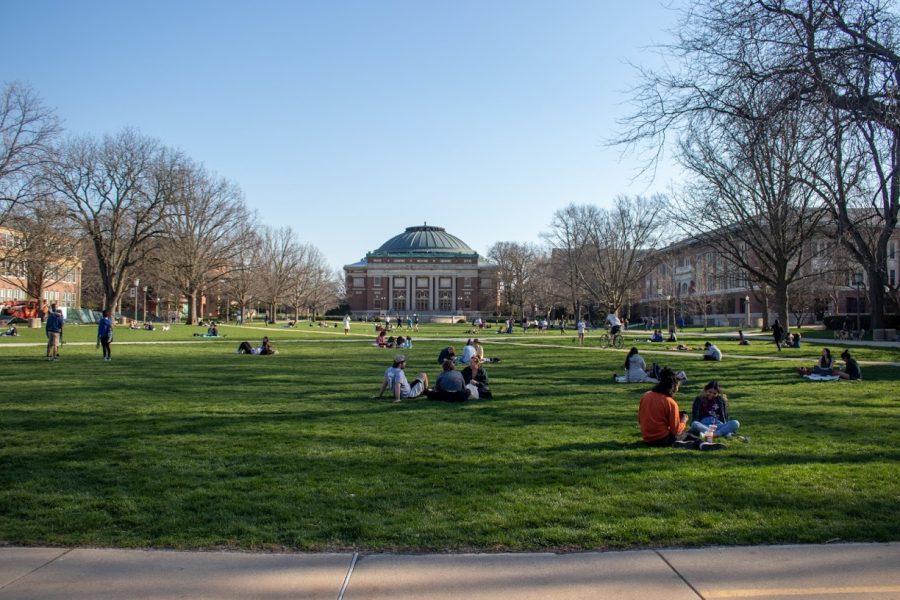Students, staff expect positive fall experiences
Students sit on the Main Quad overlooking Foellinger auditorium on April 3. University staff and students anticipate an enjoyable fall semester.
April 15, 2021
With the expansion of COVID-19 testing and an increase in vaccinations the University plans to return to having more in-person classes. As students begin to register for classes for next semester on April 19, they will be met with greater opportunities both in and outside of the classroom.
“It is looking a lot more like fall before COVID-19, so that’s exciting,” said Robin Kaler, associate chancellor for Public Affairs. “We anticipate the vast majority, of course, to be in-person. There will still be masking and social distancing, but we are anticipating it to be much more similar to the experience people had before (COVID-19).”
The University’s efforts to return back to in person learning are dependent on the vaccine rollout and student’s inclination to get it. In a recent survey conducted by the University, it was found that 88.8% of students have or plan on getting vaccinated, Kaler said.
While many students plan on getting the vaccine, it is essential for the Champaign-Urbana community to reach herd immunity. Until the state of Illinois makes it a requirement for students to have a COVID-19 vaccine, the University cannot enforce students to have it, Kaler said.
“We are really excited for student vaccinations,” Kaler said. “Whenever we announce the availability of vaccines, we tend to get a lot of interest. When you are talking about what herd immunity would be, when you are approaching 90% of people saying that they’re in, that’s going to get you to a point where you want to be at.”
Many students anticipate the fall semester with excitement and eagerness to return to the classroom. However, some students have hesitations about returning, depending on the community’s response to the vaccine, Allie Ruggiero, freshman in LAS, said.
Both students and faculty alike have noticed how different the University has been without the typical socialization. As a result of COVID-19, Ruggiero said there has been a greater sense of isolation.
“My experience with mostly virtual classes was somewhat enjoyable but I definitely did see a mental health and physical health decline,” she said. “I think I’m most excited about seeing and meeting people. It will be nice to see someone’s full face and finally be able to recognize them. Just to have a conversation normally, how it used to be.”
Ruggiero said that she feels good about going back to mostly in person and hoped most people are vaccinated by then.
“I personally am fully vaccinated, so I feel okay to start in person, but I understand other people’s worries about not wanting to, especially if the pandemic isn’t declared over yet,” Ruggiero said.
As students and faculty look ahead to next semester, the in-person connection and socialization is one of the most important factors, Andreas Cangellaris, vice-chancellor for Academic Affairs and Provost, said that the human factor was important. Cangellaris, who is very excited about in-person classes, said she missed interacting with the students.
Time at college is also a time of great learning about oneself outside of the classroom and identity formation. With having many experiences hindered due to social distancing, being able to return back to in-person settings is important for development, Cangellaris said.
“Especially for students, this is the time where their identity is being formed,” Cangellaris said. “We benefit from being with others. Being challenged by others and disagreements, and the satisfaction when we learn. That is beyond the classroom. The ability of young people to come together, no matter who they are or where they’ve come from. That is the best thing the University offers to people.”
Although the University is planning on having more in-person classes and opportunities, COVID-19 regulations will still be in place for the time being, Kaler said. While the degree isn’t known at this time, mask wearing and COVID-19 testing are still expected to be enforced next semester until the pandemic is declared over.
“If things get dramatically better, we can pivot to dramatically more in-person experience,” Kaler said. “And if things go badly, then we can pivot back to something similar to last fall.”
Since there is still time before the fall semester begins, lots of the plans can change and adapt to the status of COVID-19. Despite there still being uncertainty, Kaler said the University is confident in their plan and what is to come.
“Life is unpredictable no matter how well we plan,” Kaler said. “Life will always surprise us with challenges and unexpected events. But that is the great thing about human beings. As long as we don’t overwhelm ourselves with concerns, we find a way. We come out better. No matter what comes your way, your objective is to understand it, manage it and overcome it.”







